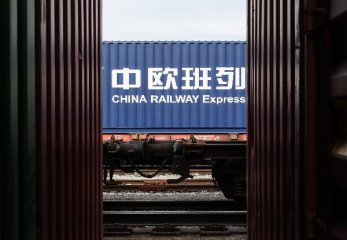BEIJING, April 18 (Xinhua) -- The Belt and Road Initiative (BRI) has provided an opportunity for the world to transition into a sustainable energy future, experts say.
Through the BRI, countries and regions could enhance energy connectivity and take a proactive approach when planning their energy infrastructure, said Zou Ji, president of the Energy Foundation China, in an interview with Xinhua.
For many countries and regions along the Belt and Road, the demand for energy, especially electricity, is tremendous. Instead of consuming coal to meet the demand, countries and regions should seek clean energy alternatives, which could be more cost-effective in the long-term, said Zou.
As China has been pushing green development, it has plenty of experience in energy transition in fields including green finance and technology transfers, which can be shared through the BRI, Zou said.
The BRI, proposed by China in 2013, aims at building a trade and infrastructure network connecting Asia with Europe and Africa along the ancient trade routes of the Silk Road to seek common development and prosperity.
Under the BRI, a Chinese construction company has undertaken the construction of solar power projects in Morocco, which is expected to provide clean energy for more than 1 million Moroccan households.
In Vietnam, a power generation station operated by a Chinese company has turned 70,600 tonnes of garbage into 18 million kilowatt hours of green electricity, boosting local economic growth while reducing pollution.
Wu Gang, chairman of Xinjiang Goldwind Science & Technology, China's largest wind turbine manufacturer by new installed capacity last year, said Chinese firms have helped cut the costs of the wind power equipment manufacturing industry by half.
The company built its first wind farm in Panama in 2013, which produced green power that accounted for about 8 percent of the country's power consumption just a year after its operation.
In addition to clean energy collaboration through the various projects, the BRI has offered a new form of inter-governmental cooperation, which integrates collaboration in various fields including technology, trade, and investments, Zou said.
"It is an open platform that promotes multilateralism and a new version of globalization," Zou said.
The Energy Foundation has been actively participating in the BRI to facilitate the global energy transition. The non-profit has a 1.7 million-U.S. dollars budget to support BRI-related projects this year, Zou said.
Specifically, the foundation will work with the United Nations Economic and Social Commission for Asia and the Pacific to fund clean energy-related projects in the Asia Pacific in the next three years, he said.
The second Belt and Road Forum for International Cooperation (BRF), scheduled to open in Beijing in late April, will offer new opportunities for governments to enhance policy coordination and for non-governmental agencies to step up collaboration on specific projects, Zou said.





















Latest comments